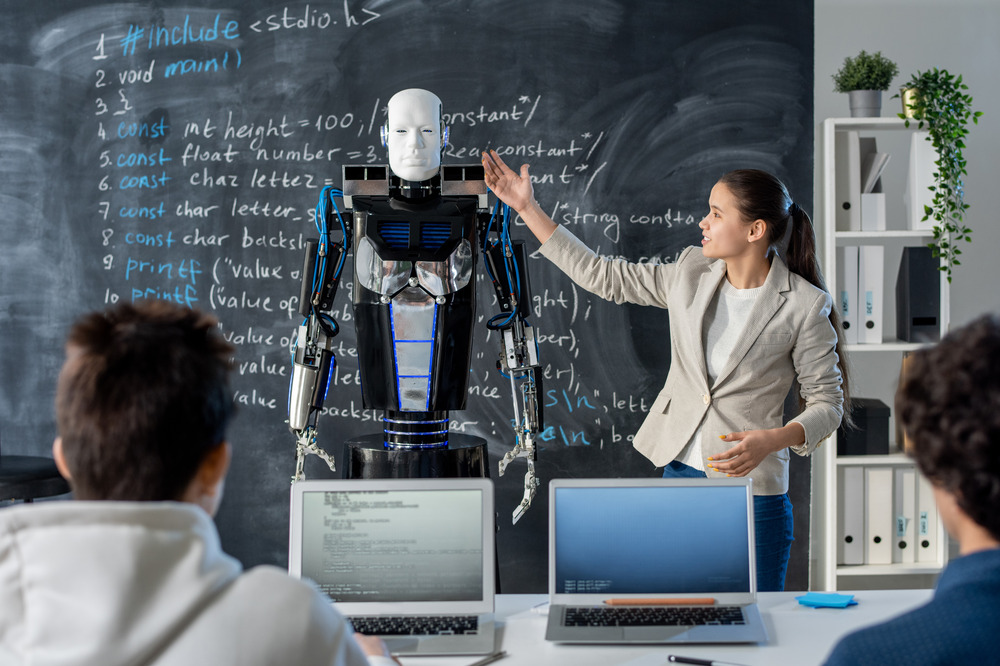Artificial Intelligence (AI) is revolutionizing education, opening new doors for learners, educators, and institutions. With its ability to process vast amounts of data and adapt to individual learning styles, AI is set to redefine how we learn and teach. As someone deeply passionate about the intersection of technology and education, I believe the integration of AI in education marks a turning point in human development. This article delves into the informativeness impact, benefits, and future vision of students shaped by AI-powered education.
The Impact of AI on Education
1. Personalized Learning
AI’s most significant contribution to education lies in its ability to personalize learning experiences. Traditional education often follows a one-size-fits-all model, which can leave many students struggling or unchallenged. AI disrupts this by:
-
Adapting to Individual Needs: AI systems analyze students’ strengths, weaknesses, and learning speeds to tailor lessons accordingly.
-
Real-Time Feedback: Through continuous monitoring, AI provides instant feedback, helping students correct mistakes and reinforcing learning.
-
Custom Learning Paths: AI-driven platforms like Duolingo and Khan Academy design customized curriculum’s, ensuring students progress at their own pace.
2. Enhanced Accessibility
AI bridges educational gaps by providing resources to underserved communities and individuals with disabilities.
-
Language Translation: AI-powered tools like Google Translate break language barriers, making learning materials accessible worldwide.
-
Assistive Technologies: AI innovations such as speech-to-text and text-to-speech make learning more inclusive for visually or hearing-impaired students.
-
Remote Learning: AI supports virtual classrooms, ensuring education reaches even the remotest corners of the globe.
3. Improved Administrative Efficiency
Educators often spend a significant amount of time on administrative tasks. AI automates processes like:
-
Grading and Assessment: Systems like Grade scope speed up evaluation, allowing educators to focus more on teaching.
-
Attendance Tracking: Facial recognition and smart systems streamline attendance management.
-
Resource Allocation: AI helps institutions manage resources, from classroom space to learning materials.
4. Gamification and Engagement
AI introduces gamified learning experiences, making education more engaging and enjoyable.
-
Interactive Learning: AI-driven platforms turn lessons into interactive games, boosting motivation and retention.
-
Progress Tracking: Gamified systems reward progress, encouraging students to achieve milestones.
Benefits of AI in Education
1. Empowering Educators
Teachers are at the heart of education, and AI serves as a valuable assistant rather than a replacement.
-
Data-Driven Insights: AI provides insights into student performance, helping educators identify areas needing intervention.
-
Enhanced Lesson Planning: AI tools assist in creating effective and dynamic lesson plans tailored to class needs.
-
Teacher Training: Virtual reality (VR) and AI simulations prepare educators for real-world challenges.
2. Democratizing Education
AI makes quality education accessible to all, reducing disparities caused by socioeconomic factors.
-
Open Educational Resources (OER): AI curates free resources, ensuring everyone has access to high-quality materials.
-
Affordable Learning Tools: AI-powered apps and platforms offer cost-effective solutions for learners globally.
3. Fostering Lifelong Learning
The nature of work and knowledge is constantly evolving. AI encourages continuous education by:
-
On-Demand Learning: Platforms like Coursera and edX allow professionals to upskill anytime, anywhere.
-
Adaptive Content: AI ensures learners stay updated with the latest advancements in their fields.
-
Micro-Learning: Short, focused lessons cater to busy individuals seeking quick knowledge bites.
4. Cultivating Critical Thinking
AI fosters analytical and critical thinking by providing tools and scenarios that challenge students to solve problems creatively.
The Vision for Students’ Future with AI in Education
1. A Personalized Learning Journey
Imagine a future where each student has a personal AI tutor that understands their unique needs, goals, and learning styles.
-
Individualized Growth Plans: AI mentors guide students through customized academic and career pathways.
-
Continuous Adaptation: AI evolves with students, providing relevant content and challenges as they grow.
2. Collaborative Learning Environments
AI fosters collaboration by connecting students worldwide.
-
Global Classrooms: Virtual reality (VR) powered by AI enables students to collaborate in simulated environments.
-
Cultural Exchange: AI translation tools facilitate cross-cultural interactions, enriching learning experiences.
3. Ethical and Responsible AI Learning
Students will learn to use AI ethically and responsibly, preparing them for AI-integrated careers.
-
AI Literacy: Curriculum’s will include AI understanding, coding, and critical analysis of its implications.
-
Responsible Usage: AI will teach students about data privacy, ethics, and the societal impact of technology.
4. Preparing for Future Careers
AI equips students with skills for tomorrow’s workforce, emphasizing creativity, adaptability, and technical expertise.
-
STEM Integration: AI promotes science, technology, engineering, and mathematics (STEM) learning through interactive tools.
-
Soft Skills Development: AI simulations enhance communication, leadership, and emotional intelligence.
Challenges and Considerations
While AI brings immense potential, it also poses challenges:
-
Data Privacy: Protecting students’ personal data is crucial as AI systems collect and analyze vast amounts of information.
-
Digital Divide: Ensuring equal access to AI-powered education remains a priority, especially in underprivileged areas.
-
Ethical Concerns: Developing unbiased and transparent AI systems is essential to prevent discrimination and misinformation.
My Opinion: A Balanced Approach
As Monika, I believe the integration of AI in education should be approached with enthusiasm and caution. While the benefits are undeniable, we must ensure AI enhances, not replaces, the human connection in education. Teachers bring empathy, creativity, and inspiration that AI cannot replicate. Combining these qualities with AI’s efficiency can create a harmonious and transformative learning ecosystem.
AI in education is not just a trend; it is a paradigm shift that holds the promise of transforming learning experiences for generations to come. By personalizing education, improving accessibility, and preparing students for the future, AI is reshaping how knowledge is imparted and absorbed. With a balanced approach and ethical considerations, AI can ensure a brighter, more inclusive, and innovative future for education.



